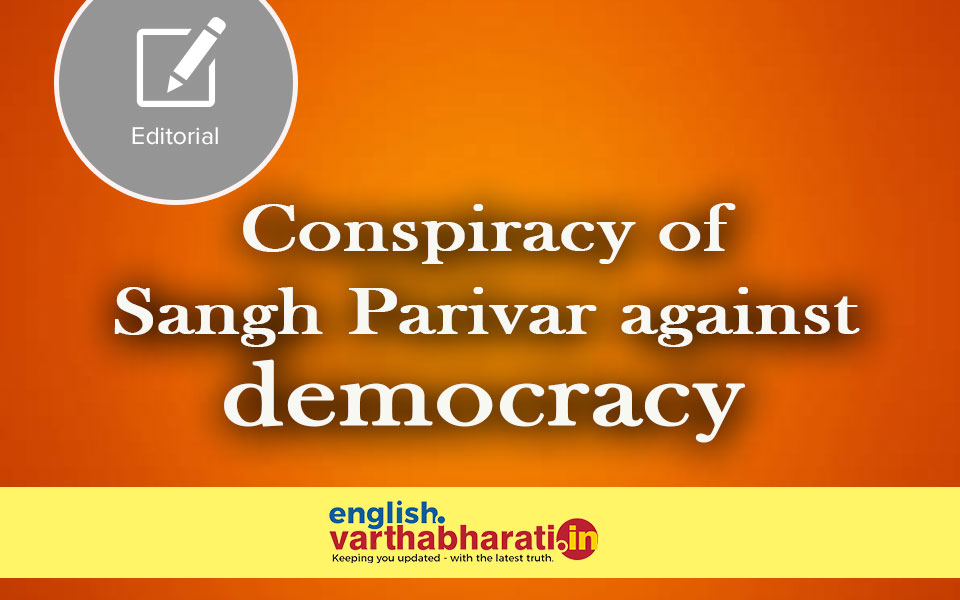The secret agenda of BJP is not so secret anymore. Having successfully split people in the name of caste, and faith, BJP aka Sangh Parivar has started with its objections against the constitution that has been accepted by all. The intolerance of brahminical mindset against the constitution written by a Dalit scholar is out in the open. The conspiracy against the constitution written by Baba Saheb Ambedkar that considered the welfare of all communities, has been on since long.
RSS Secretary Suresh Joshi has recently voiced his opinion against the constitution in Gwalior on Sunday at the All India RSS Representatives Meeting stating the constitution alone cannot take the country further since it cannot protect the tenets of Hindu dharma and traditions. Hence the RSS would be getting to the task of fixing it. RSS has started working on its hidden agenda of working up public opinion against Supreme Court ruling against traditional Hindu celebrations such as Jallikattu, bursting of crackers, women entering Sabarimala temple and other related issues.
This is not the first time that the Sangh Parivar has launched an attack on constitution. This has been on since the time this country got the independence. Constitution was accepted after long drawn discussion and debating by the designated committee on the draft submitted by Dr Ambedkar. By then itself the second Sarsanghchalak Madhava Sadashiva Golwalkar had already sounded dissidence. “This constitution drafted by Ambedkar does not embody the values of the heritage of this land. This does not reflect the Hindu Sanskriti that the country stands for,” he had said. But since the then Home Minister Sardar Vallabh Bhai Patel had already banned RSS, Sangh Parivar was mute till late.
The ban was lifted only after Golwalkar gave an undertaking. The organization lie mute till the recent days when Modi became the PM and people began speaking against the constitution and their desire to change it. BJP leader with Sangh roots Ram Madhav and RSS Sarsanghchalak Mohan Bhagwat among others have been speaking about this quite openly. Now since Suresh Joshi has said this in the meeting, the agenda has become even clear.
The Hindu culture and beliefs that Suresh Joshi subscribes to, are no secret anyway. His Hindu culture will denial of women entering into the temples much like Brahminism and that should not be questioned ever by constitution or court. Supreme Court has banned crackers saying this contributes to environmental pollution, and is dangerous to humans and animals as well. But the Sangh won’t accept it. Constitution has lifted the ban on entry of Dalits into temples. As per RSS and Hindu faith system, they may not only oppose to Dalits entering the temple, but also their migrating to urban areas on the whole. And as far as the reservation to SC/ST and other categories are concerned, RSS Sarsanghchalak Mohan Bhagwat has already opposed it many a times.
This proves one thing beyond doubt. Any agenda of Sangh Parivar is not a secret anymore. Constitution and reservation would be under threat if BJP government comes to power again in the centre. Hence people should strive to retain the rights given to them by the constitution irrespective of caste, creed, faith or gender. If they do not wake up now, the constitution would be under threat. All the facilities communities have been getting so far would disappear. Corporate and communal fascist combination would destroy this country forever.
The construction of Ram Mandir, Gau Raksha Abhiyana and others are all Sangh Parivar agendas. Their sole aim is to polarize the society and clinch power, then eradicate the reservation given to underprivileged communities. Take out the protection given to women and backward communities given by the constitution and then impose class based system on the society in the direction of Manu’s ideology. BJP ministers like Anant Kumar Hegde have been speaking about changing the constitution since the beginning. This is not a standalone opinion, but the sole purpose of the RSS. This is more than clear now, with Joshi’s statement.
The upcoming election is a battle between those who want to destroy the constitution and those who want to keep it. People have to choose between these two.
Let the Truth be known. If you read VB and like VB, please be a VB Supporter and Help us deliver the Truth to one and all.
Kalaburagi: Four men have been arrested in Kalaburagi on charge of hacking a man with lethal weapons and pelting stones at him under the limits of Station Bazaar Police Station recently.
According to police sources, Anand Jalak Shinde (34), Ashitosh Jalak Shinde (30), Imran Mehboob Sheikh (28) and Sohaib Anwar Qureshi have been arrested. The men are accused of the brutal murder of Syed Mehboob, a resident of Station Bazaar Upper Line Hamalawadi in the city.
An FIR was filed by the Station Bazaar Police Station based on a complaint given by Syed Ismail, father of the deceased Syed Mehboob.
Following quick probe, the police team successfully arrested the suspects within 24 hours. The arrested men were produced in court and have been sent to judicial custody.
The City Police Commissionerate has appreciated in an official release the police team’s quick solving of the murder case and arrest of the four men accused of murdering Syed Mehboob.





